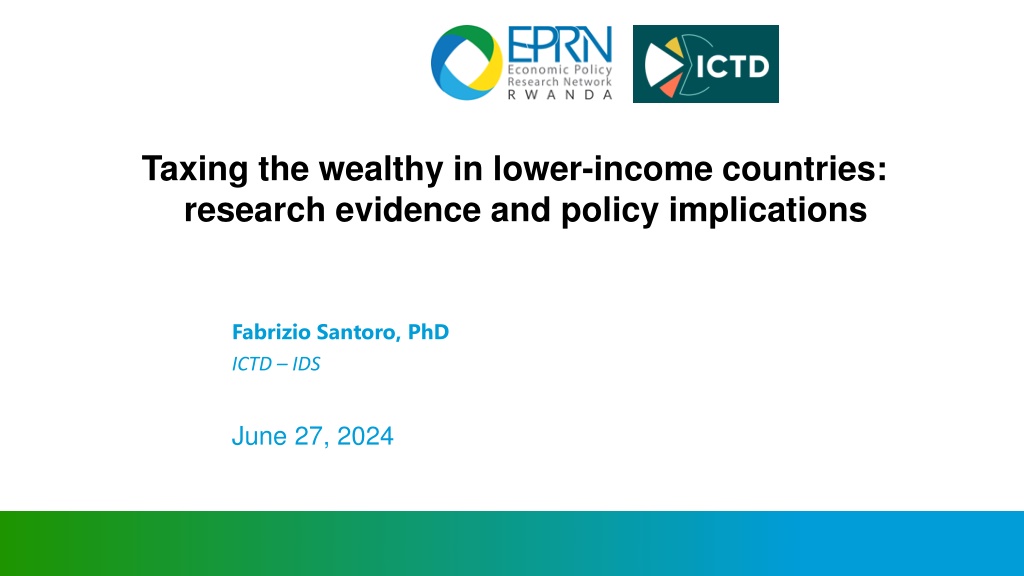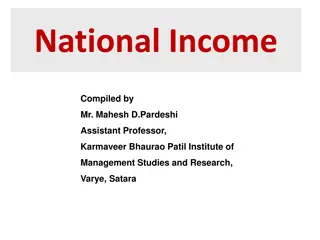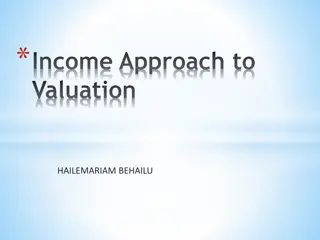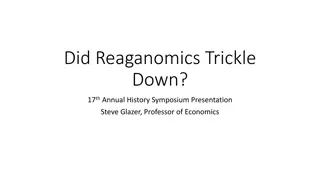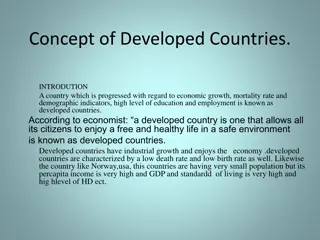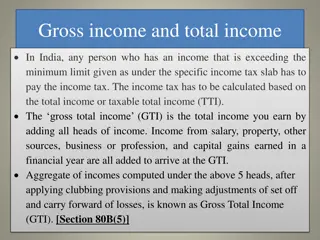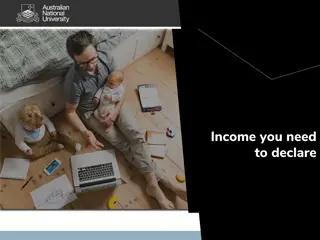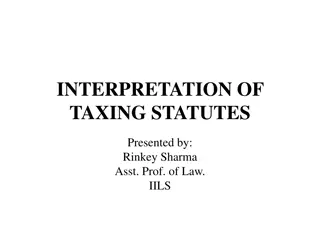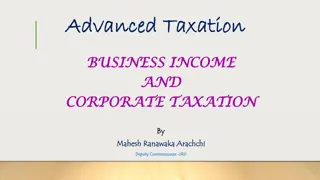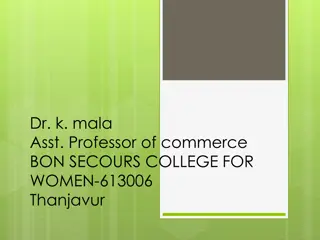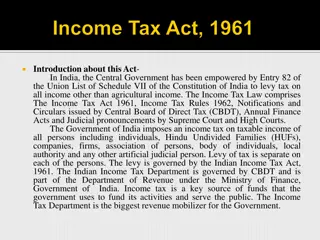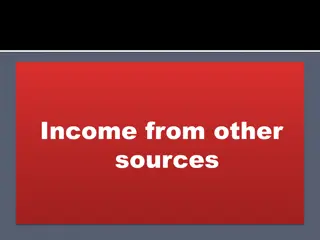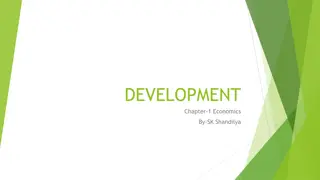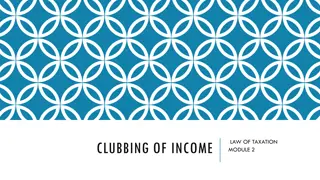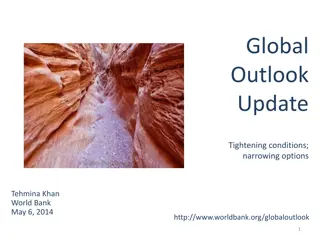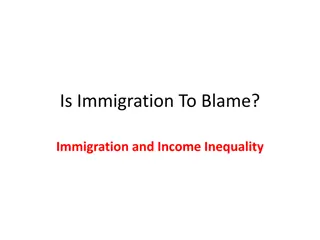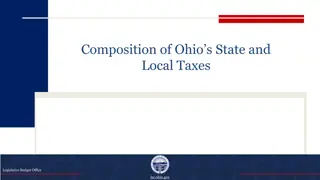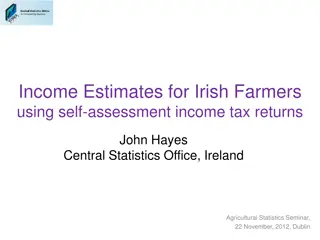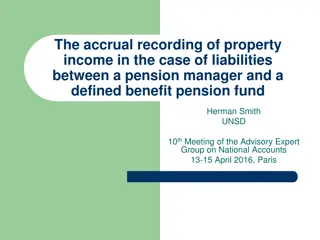Taxing the Wealthy in Lower-Income Countries: Research Evidence and Policy Implications
The world is facing various crises, with lower-income countries disproportionately affected. To boost revenue without new wealth taxes, effective taxation of the wealthy is crucial. Existing taxes in LICs are inadequate compared to HICs. Wealth inequality is stark in LICs and Sub-Saharan Africa. Improving existing income source taxes can benefit LICs economically.
Download Presentation

Please find below an Image/Link to download the presentation.
The content on the website is provided AS IS for your information and personal use only. It may not be sold, licensed, or shared on other websites without obtaining consent from the author. Download presentation by click this link. If you encounter any issues during the download, it is possible that the publisher has removed the file from their server.
E N D
Presentation Transcript
Taxing the wealthy in lower-income countries: research evidence and policy implications Fabrizio Santoro, PhD ICTD IDS June 27, 2024
The world is experiencing a combination of multiple crises, including increasing global tensions, skyrocketing debt levels, and climate change - Lower-income countries (LICs) are bearing the brunt of these Finances LICs count on are not growing at a sufficient pace A key tool to raise more revenue: taxing the wealthy more effectively How to do that? We argue that this will be possible even without introducing new wealth taxes - hot debate in US, UK, Europe and Latin America - recent UN report with a strong focus on wealth taxation in LICs (UN 2023) - no LIC has to date successfully implemented a wealth tax successfully 2 Ministry of Trade and Industry 2013 Economic Policy Research Network www.eprnrwanda.org
Revenue LICs raise from existing taxes on properties, inheritances, or financial transactions is much less as % of GDP than in HICs 3 Ministry of Trade and Industry 2013 Economic Policy Research Network www.eprnrwanda.org
4 Ministry of Trade and Industry 2013 Economic Policy Research Network www.eprnrwanda.org
LICs in general, and SSA in particular, exhibit an even starker wealth inequality than HICs 5 Ministry of Trade and Industry 2013 Economic Policy Research Network www.eprnrwanda.org
6 Ministry of Trade and Industry 2013 Economic Policy Research Network www.eprnrwanda.org
7 Ministry of Trade and Industry 2013 Economic Policy Research Network www.eprnrwanda.org
LICs will be better off by first focusing on improving the performance of existing instruments that is, taxes on various sources of income, including rents and capital gains 8 Ministry of Trade and Industry 2013 Economic Policy Research Network www.eprnrwanda.org
1. These tax instruments are already enshrined in existing laws, and debates about their more thorough enforcement are likely going to be less controversial than introducing new taxes - Research on property tax reforms (Jibao and Prichard 2015, 2016) and taxation of wealthy individuals (Kangave et al. 2016, 2023, Occhiali et al. 2024) conducted in SSA mustering the political will necessary to counterbalance elite opposition is one of the main obstacles to proper enforcement of existing tax laws opposition to the introduction of new taxes will be even more substantial high risk of hijacking of parliamentary discussion in order to kill significant reforms (Fairfield 2010) 9 Ministry of Trade and Industry 2013 Economic Policy Research Network www.eprnrwanda.org
2. the effective design of wealth taxes requires the accessibility of a variety of data sources which are often lacking across many LICs a better enforcement of income and property taxes, which often have information forms as part of the tax return, could importantly contribute to acquiring this data 10 Ministry of Trade and Industry 2013 Economic Policy Research Network www.eprnrwanda.org
3. personal income taxes (PIT) account for a much lower proportion of LICs than of HICs domestic product their top marginal tax rates have also been decreasing substantially, although they remain above those of HICs when effective tax rates are considered, they are significantly lower in LICs narrower tax bases, discretionary tax exemptions, and suboptimal enforcement of various tax handles due both administrative and political issues 11 Ministry of Trade and Industry 2013 Economic Policy Research Network www.eprnrwanda.org
12 Ministry of Trade and Industry 2013 Economic Policy Research Network www.eprnrwanda.org
13 Ministry of Trade and Industry 2013 Economic Policy Research Network www.eprnrwanda.org
4. improving compliance from wealthy individuals with existing tax obligations would contribute to increasing the equity of LICs tax system often disproportionate burden on few formal employees, small domestic firms, and consumers often more enforcement on registering small informal actors than to expand revenue collection from self-employed professionals or those with investment income (Gallien et al. 2023) studies on CIT (Mascagni and Mengistu 2019) and VAT (Brockmeyer et al. 2024) in LICs show that smaller taxpayers often face higher effective tax rates than larger ones 14 Ministry of Trade and Industry 2013 Economic Policy Research Network www.eprnrwanda.org
5. revenue foregone by lax enforcement of income and property taxes is likely to be substantial evidence from Uganda shows that focusing on the compliance of wealthy individuals with income taxes can quickly lead to substantial gains (Kangave et al. 2018) although they are hard to maintain (Santoro and Waiswa 2023) and the same is true in the case of progressive property tax reforms in Freetown (ATI) 15 Ministry of Trade and Industry 2013 Economic Policy Research Network www.eprnrwanda.org
How to make existing taxes work better in targeting wealthy individuals? 16 Ministry of Trade and Industry 2013 Economic Policy Research Network www.eprnrwanda.org
1. Strengthen tax administration establish a taskforce or a unit with trained officials to work specifically on HNWIs fully enforce the submission of information forms for withholding taxes, of tax clearance certificates, and of conveyances crucial sources of information consider the establishment of a voluntary asset declaration scheme connected to a one-time amnesty one-off wealth tax introduced in Argentina relied on information gathered during a voluntary assets declaration scheme implemented in 2016, through which over USD 117 billion were repatriated leading to a collection of almost USD10 billion in tax revenue (Londo o-V lez and Tortarolo 2022) medium-term investments on digitalising individual tax returns, technical and technological capacity to register properties and assess their value, agreements with other institutions to gather more information o o 17 Ministry of Trade and Industry 2013 Economic Policy Research Network www.eprnrwanda.org
2. Improve legal and policy frameworks for better data sharing introduce new legal provisions where needed verifying if capital gains, rental, dividend, and interest incomes are currently covered by tax legislation ensure that the submission of dedicated tax and information returns is mandatory explicit legal provisions for the sharing of information between public bodies (for example, the Ministry of Land) private entities (chiefly commercial banks) and the revenue authority adopt a clear definition of who qualifies as a HNWI o very small number of individuals with a (legal) net worth of USD 1mln, the OECD definition o URA established two main sets of criteria were developed to define HNWIs core and non- core parameters qualifying for any single core parameter, or for the combination of any two non-core parameter, is sufficient to be considered an HNWI o 18 Ministry of Trade and Industry 2013 Economic Policy Research Network www.eprnrwanda.org
3. Political considerations establish a cooperative, rather than coercive, compliance strategy URA engaged and obtained buy in from politicians the unit approach was framed as cooperation rather than enforcement invest in sensitisation, education, and communication campaigns engage broadly with civil society actors and associational bodies to promote a culture of compliance 19 Ministry of Trade and Industry 2013 Economic Policy Research Network www.eprnrwanda.org
Thank You Contact: Fabrizio Santoro f.santoro@ids.ac.uk
